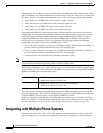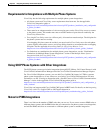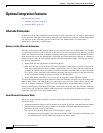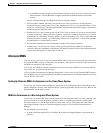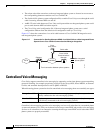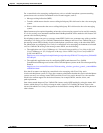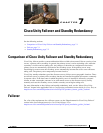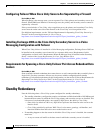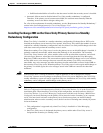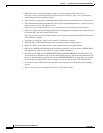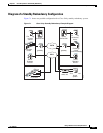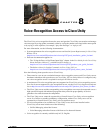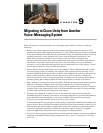
7-2
Design Guide for Cisco Unity Release 5.x
OL-14619-01
Chapter 7 Cisco Unity Failover and Standby Redundancy
Standby Redundancy
Configuring Failover When Cisco Unity Servers Are Separated by a Firewall
Revised May 6, 2008
When Exchange is the message store, you can separate Cisco Unity primary and secondary servers by a
firewall. When IBM Lotus Domino is the message store, the primary and secondary servers cannot be
separated by a firewall.
If the system includes a Cisco Unity voice recognition server, the primary and secondary Cisco Unity
servers must be on the same side of the firewall as the Cisco
Unity voice recognition server.
For additional requirements, see the “Failover Requirements for Separating Cisco Unity Servers by a
Firewall” in the System Requirements for Cisco
Unity at
http://www.cisco.com/en/US/products/sw/voicesw/ps2237/prod_installation_guides_list.html.
Installing Exchange 2003 on the Cisco Unity Secondary Server in a Voice
Messaging Configuration with Failover
When Cisco Unity failover is installed in a Voice Messaging configuration, Exchange Server 2003 can
be installed on the secondary server instead of on a separate, third server. Requirements for this
configuration are listed in the “Requirements When the Message Store Is Installed on the Secondary
Server” section of the System Requirements for Cisco
Unity Release 5.0 at
http://www.cisco.com/en/US/products/sw/voicesw/ps2237/prod_installation_guides_list.html.
Requirements for Spanning a Cisco Unity Failover Pair Across Redundant Data
Centers
Revised May 6, 2008
Some customers maintain redundant data centers that are so well connected that they essentially form a
single LAN. For these customers, failover may be a more suitable configuration than standby
redundancy. For detailed requirements for this configuration, see the section “Failover Requirements for
Separating Cisco
Unity Servers by a WAN” in the System Requirements for Cisco Unity at
http://www.cisco.com/en/US/products/sw/voicesw/ps2237/prod_installation_guides_list.html.
Standby Redundancy
Note the following about a Cisco Unity system configured for standby redundancy:
• The standby redundancy configuration requires a minimum available bandwidth of 100 Mb/second
between the data centers in which the Cisco
Unity primary and secondary servers are installed. This
is because of two bandwidth spikes, one caused by SQL Server, the other by Cisco
Unity:
–
Once daily (by default at 2:00 a.m.), SQL Server replicates data from the active server to the
inactive server.
–
Cisco Unity periodically replicates WAV files of voice names, greetings, call handlers, and
interview handlers from the active server to the inactive server.
• If something happens to the data center in which the Cisco Unity server is installed, the customer
must have:
–
A way to reroute call traffic to the data center in which the secondary server is installed.



